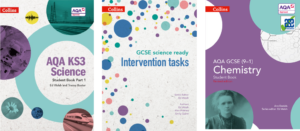With the new school year on the horizon, we asked Science consultant Ed Walsh for his advice on effective planning for both KS3 and KS4 Science.
Q: I have been asked to come up with a skeleton, ‘knowledge based’ scheme of work for KS3 (which, for us, includes Years 7 and 8 only) – and a more senior colleague is doing the same for KS4. It seems to me, however, that we should be working together to plan a journey for students that takes them all the way through from the start of Y7 to their GCSEs, especially given that science is not a subject we permit learners to drop at KS4. Do you think it’s possible to plan an effective KS4 curriculum without some input into what happens at KS3 – or vice versa?
Ed Walsh: This is a great question and one that quite a few schools are actively exploring. Straight answer to your question – no. Not if it’s to be effective.
One of the most powerful questions you can ask is, “Is our KS3 course doing its job in getting our students ‘GCSE ready’? There’s too much in the GCSE courses to risk students starting them without a good foundation. Science is a five-year course.
I’m interested though in what you mean by a knowledge based course; in my experience that means different things to different people. You might say, for example, that one of the outcomes is that students should ‘know the difference between contact and non-contact forces’. How about ‘know how to set up and use a microscope’ or, ‘know how to construct a conclusion from evidence’? This procedural knowledge, looking at the GCSE exams, should also be well represented at KS3. Maybe a good starting point is to think of an entry profile into GCSE and consider what that might consist of. Identify which concepts, processes, ideas and skills students should be able to draw upon to successfully access a GCSE course, then look to incorporate this into KS3. There’s a case for including maths and literacy skills; it’s pretty risky to start students on a GCSE course without them being able to construct sentences that convey scientific ideas, or for them to think that science doesn’t make use of numeracy.
A final thought – one of the messages from this summer’s exams is that students sometimes struggle to apply ideas to novel contexts (try Googling ‘carrotgate’). I think a good KS3 course would make it clear that this is part of being a scientist.
Ed Walsh is a freelance consultant, specialising in Science education. A teacher for twenty years and a team leader for twelve of those, he now writes and edits curriculum materials, designs and delivers CPD and works with science departments to improve the quality of their provision.
His work for Collins includes editing the following series: AQA KS3 Science, GCSE Science Ready, AQA GCSE (9-1) Science, and OCR Gateway GCSE (9-1) Science.
This article, along with more advice from Ed Walsh, will feature in the September 2018 edition of Teach Secondary magazine. See more from Teach Secondary.




